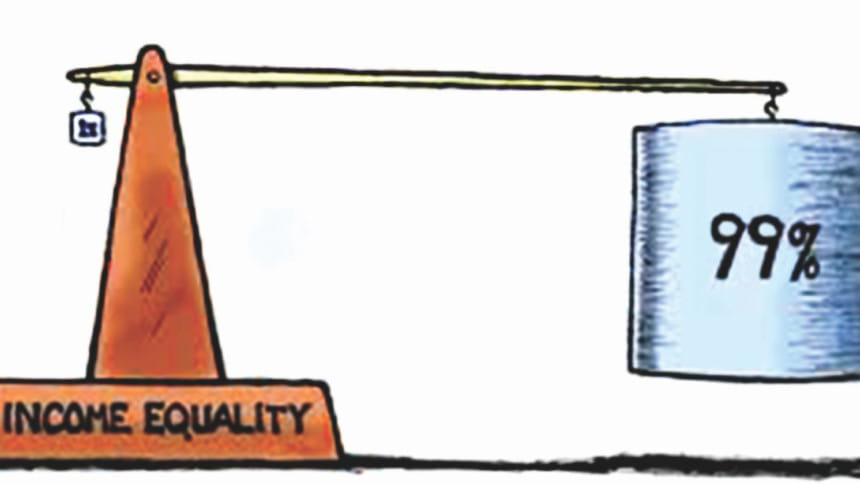The “1 percent world”

According to a recent report "An Economy for the 1%" released by Oxfam, "wealth inequality has grown to the stage where 62 of the world's richest people own as much as the poorest half of humanity combined." The research also found that the wealth of the poorest half of the world's population – 3.6 billion people – has fallen by 41 percent since 2010. The message is very clear – the poor are becoming poorer and the gap between the rich and the poor is increasing.
Income disparity has been a topic of discussion among experts for quite some time now. However, for a lay person like me, the issue boils down to a single existential question: Do we really want to live in a world where one percent owns more wealth than the rest of us combined and a large segment is living in poverty, resulting in insecurity and social injustices? Apart from the ethical implications, there are two major areas of concern.
In a world where leaders are continually advocating democracy and equal rights for all citizens, it is scary to imagine that 62 people wield so much power (wealth being a major determinant of power) over the rest of us without being held accountable in any way. The insouciance of the world leaders in addressing the issue is indeed shocking. As I write this piece, they are assembled in the pristine environs of Davos, for the World Economic Forum. Interestingly, the focus is on economic growth – equity, if discussed at all, is a peripheral subject.
The second concern is more real - in the long run, sharp income differences create deep social tensions. When the bottom economic segment is deprived of their basic needs, they end up feeling disempowered, hopeless and resentful. The obvious casualty is social cohesion leading to community alienation and segmentation. Unfortunately, the electronic and print media have exacerbated the social tensions by over- publicising astronomical wealth-generating successes and the lifestyles of celebrities. Rarely does one find the media championing middle-class values such as hardwork and thrift, and the humanitarian and philanthropic work of faceless dedicated workers. The result is escalating anger and frustration in societies. In the absence of safety nets providing jobs and education, the bottom segment of the population could undergo a social collapse, resorting to anti-social activities. In fact, it would not be a gross exaggeration to conflate the street anger in the Middle East and other developing countries with the years of exploitation and socio-economic injustices.
Frankly, I consider myself truly fortunate to have grown up in an era when life was relatively simple, expectations were manageable, and dreams were, more or less, attainable. Inequalities were not starkly visible, symbols of ostentation were frowned upon and communities cared about their members. Regrettably, today's adverse social context has exerted a negative influence on basic emotional responses and there has been an overall decline in empathy and compassion. While I don't have empirical evidence to prove my point, but on a purely human scale, is it acceptable that relatively prosperous societies should rail against helpless refugees fleeing the prospect of losing their lives? Is it acceptable that a respected journalist lying injured by the roadside in Dhaka was refused help from people passing by? Is it acceptable that a rape victim in a Delhi street was not picked up by passing cars despite her companion's calls for help? This is by no means the "progressive society" that we espouse and desire to create!
I am amazed at the growing insensitivity to the social injustices accompanying the current model of "economic growth". It is shocking that many "experts"seem to believe that the poor are victims of their own choice and a "poor" work ethic is at the core of their misfortune. The argument that prosperity will trickle down eventually is also a ruse that is used to skirt the issue.
The truth is that the inequitable distribution of wealth is largely the result of flawed national and global policies that have done very little to close the income gap. The financial systems are being manipulated, enabled by changes in the rules that have been influenced by the financial industry itself. The rich have simply exploited a weak system with few checks and balances.
The top 1 percent may not care about the state of the rest of the world because they have access to the best houses, the best educations, the best doctors and the best lifestyles. But no matter how insulated the super rich make themselves, they cannot deny that their fate is closely linked to how the other 99 percent live. For they cannot escape the angst caused by the cries of hungry children outside their doors or the threat of random terror attacks in a volatile and unbalanced society. Perhaps they need to go through some serious self-reflection and ask themselves: Do we want our children to inherit such a socially polarised and unstable world?
The writer is a renowned Rabindra Sangeet exponent and a former employee of the World Bank.
E-mail: [email protected]

 For all latest news, follow The Daily Star's Google News channel.
For all latest news, follow The Daily Star's Google News channel. 



Comments